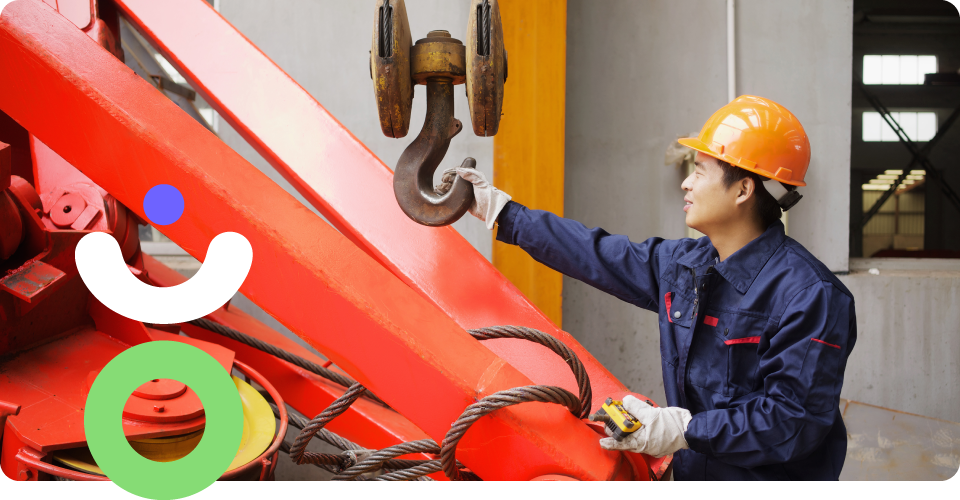What is the Experience Modification Rating (EMR Rating)? Why Should Construction Companies Care?


- Published On: 21.07.2022
- EHS Software

The Experience Modification Rate (EMR) is an important factor that construction companies must consider when purchasing workers’ compensation insurance. This calculation, which is based on a company’s claims history, can have a significant impact on the premiums that a construction company must pay for its insurance coverage.
In this article, we will explore what EMR is, how it is calculated, and the ways in which it can impact the cost of insurance for construction companies.
What is the Experience Modification Rating (EMR)?
The Experience Modification Rate (EMR) is a calculation used by workers’ compensation insurance companies to determine the relative level of risk associated with insuring a particular business. In the construction industry, a high EMR can result in higher insurance premiums, which can impact a company’s bottom line.
How is it Calculated?
The Experience Modification Rating (EMR) is calculated by comparing a company’s claims history to industry averages. It is based on the number and severity of workers’ compensation claims filed by a company’s employees over a three-year period. The exact formula for calculating EMR varies among insurance providers, but generally it includes factors such as the company’s total payroll, the number and cost of claims, and the industry average for claims. The resulting EMR is then used to adjust the company’s insurance premiums.
What are the Advantages of using EMR?
There are several advantages of using the Experience Modification Rating (EMR) in the workers’ compensation insurance industry. Some of these advantages include:
EMR provides a standard method for comparing the claims history of different companies. This allows insurance providers to accurately assess the level of risk associated with insuring a particular business and adjust premiums accordingly.
EMR incentivizes companies to implement safety programs and reduce the number and severity of workers’ compensation claims. By doing so, companies can improve their EMR and potentially lower their insurance premiums.
EMR allows insurance providers to more accurately price their policies and reduce their own risk exposure. By using EMR to adjust premiums, insurance providers can better manage their own risk and avoid overcharging or undercharging for coverage.
EMR provides transparency and fairness in the workers’ compensation insurance market. By using a standard method for comparing the claims history of different companies, EMR ensures that businesses are not unfairly penalized or rewarded based on factors outside of their control.
Overall, the use of EMR in the workers’ compensation insurance industry provides benefits for both companies and insurance providers. It allows for more accurate pricing of policies and encourages companies to prioritize safety in their operations.
Why Should my Construction Company be Concerned with its EMR?
A construction company should be concerned about its Experience Modification Rating (EMR) for several reasons.
EMR can impact the cost of insurance. Insurance providers use EMR to adjust premiums for workers’ compensation coverage. A higher EMR indicates a higher level of risk and may result in higher premiums for the business. This can have a significant impact on a construction company’s bottom line, especially if the company has a high number of employees or operates in a high-risk industry.
EMR can impact a company’s reputation. A high EMR can be seen as a sign of poor safety practices, which can damage a company’s reputation and make it less competitive in the marketplace. In the construction industry, where safety is a key concern, a high EMR can make it more difficult for a company to win bids and secure contracts.
EMR can impact a company’s ability to obtain insurance coverage. In some cases, insurance providers may refuse to provide coverage to companies with very high EMRs. This can leave a construction company without the necessary insurance coverage, which can expose it to significant financial and legal risks.
Therefore, a construction company should be concerned about its EMR as it can impact the cost of insurance, reputation, and ability to obtain coverage. By implementing safety programs and reducing the number and severity of workers’ compensation claims, a construction company can improve its EMR and mitigate these risks.
What Efforts Can a Construction Company Make to Improve it's EMR Rating?
A construction company can take several steps to improve its Experience Modification Rating (EMR) and reduce its insurance premiums. Some of these efforts include:
-
Conducting regular safety audits to identify and address potential hazards on the job site. This can include things like providing proper training and protective gear for employees, implementing safety protocols, and regularly inspecting equipment and tools.
-
Investing in safety technology, such as cameras and monitoring systems, to prevent accidents and injuries on the job site. These technologies can not only improve safety, but also help to reduce claims and improve a company’s EMR.
-
Using video-analytics to monitor the job site and identify potential safety hazards. This can provide real-time data and alerts that can help prevent accidents and injuries.
-
Encouraging employees to report injuries and accidents. If employees are afraid to report incidents, it can lead to underreporting and a higher EMR. By creating a culture of safety where employees feel comfortable reporting incidents and receiving the proper medical attention, a construction company can improve its EMR.
-
Partnering with a workers’ compensation insurance provider that offers safety services. Some insurance providers offer additional services, such as safety training and consulting, to help their clients improve their EMR and reduce claims. By partnering with one of these providers, a construction company can gain access to these services and improve its EMR.
Overall, implementing these strategies can help a construction company improve its EMR and potentially reduce its insurance premiums. This can have a positive impact on the company’s bottom line and reputation, and help to create a safer work environment for employees.
Conclusion
Experience Modification Rating (EMR) is an important factor for construction companies to consider when purchasing workers’ compensation insurance.
EMR is a calculation used by insurance providers to determine the relative level of risk associated with insuring a particular business. A high EMR can result in higher insurance premiums, which can impact a company’s bottom line.
In addition, a high EMR can damage a company’s reputation and make it less competitive in the marketplace. Therefore, construction companies should pay attention to their EMR and take steps to improve it, such as implementing digital safety programs and reducing the number and severity of workers’ compensation claims. This can help to lower insurance premiums and improve a company’s reputation.
- 21.07.2022

Businesses can obtain certification in a standard for occupational health and safety management in order to prevent and reduce onsite work accidents…

OSHA’s record keeping rules require employers to maintain accurate and detailed records of workplace injuries and illnesses.

The primary goal of any strategy is to prevent accidents or injuries caused by the employer’s or employee’s carelessness or bad judgment. Injury prevention can be accomplished…